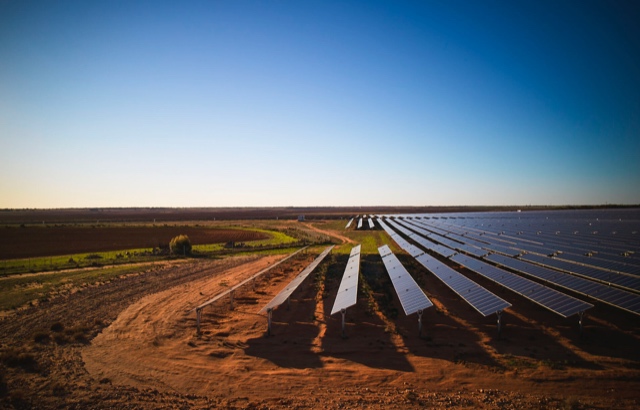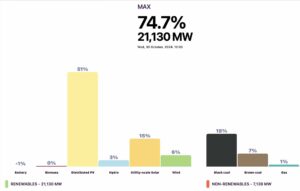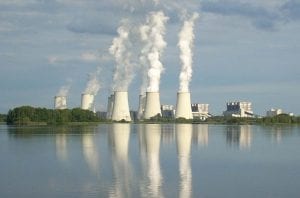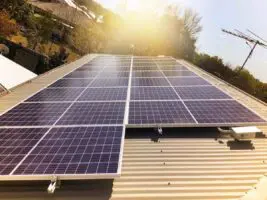New South Wales energy minister Matt Kean has dramatically widened the gulf between the NSW state Coalition government and the federal Coalition government after declaring that bringing an end to coal fired generation by 2030 is entirely feasible.
“We absolutely can make that target,” Kean said in response to a question on ABC Radio National’s breakfast program about the call from the UN, and many scientists, for developed countries like Australia to bring coal generation to an end by 2030 to held deliver the 1.5°C target.
“We’ve got the biggest renewable energy plan that’s been legislated in the nation’s history right here in New South Wales, and that means as our coal fired power stations come to the end of their lives over the next years that will be replaced with renewables,” Kean said.
He cited the state Coalition government’s infrastructure roadmap, which will create at least five big renewable energy zones, and which has already been overwhelmed by proposals from wind, solar and storage developers.
The New England renewable zone has attracted expressions of interest for more than 34GW of large scale renewable and storage projects, and the Central West Orana zone has attracted 27GW.
“We’re preparing for the future; it’s clean, green, and it will deliver the cheapest and most reliable energy anywhere in the country,” Kean said.
“So we think that we can easily make that target, and do it in a way that not only looks after our environment, but sets us up for a prosperous future.
“We’re already seeing the impacts of not taking action on climate change … bushfires or severe droughts, or the impacts of potentially on our tourist industry.
“We’re hoping to address that, but also create jobs, drive investment, give our industry, a competitive advantage in a world that is moving very quickly today,
Kean’s comments are significant because NSW has the biggest coal fleet in the country, with more than 10GW of capacity, although they are proving to be increasingly unreliable as they age.
The Liddell generator is due to close in early 2023, Vales Point by 2029 and Eraring by 2032, with Bayswater and Mt Piper currently scheduled to close in the mid 2030s. But this could, and likely would, be brought forward as more wind and solar and storage enters the grid.
Kean’s comments put him at odds with federal Coalition government, which is seeking to dodge tighter and more ambitious climate targets, has ridiculed suggestions that coal could be removed from the system as “nonsense”, and seems to be doing its best to protect the fossil fuel industry.
Australia is under intense pressure ahead of the UN sponsored climate talks in Glasgow in November, and is the subject of numerous analyses looking at the influence of the fossil fuel lobby on the federal government, and the need to leave m oct of its coal in the ground.
Kean has also stated he is not a support of federal energy minister Angus Taylor’s push for a capacity market that would underpin coal generation, arguing that direct contracts might work better to ensure unexpected early exits and for a managed solution.
Kean also revealed on Friday the government will not appeal a landmark decision last month when the NSW Land and Environment Court ruled that the NSW Environmental Protection Authority has a duty “to develop environmental quality objectives, guidelines and policies to ensure the protection of the environment in NSW from climate change”.
The court also found that the NSW EPA has failed in that duty and ordered the authority to take action to meet its obligations.
“No, we won’t be appealing that decision,” Kean said. “In fact, we’ll be putting in place the policies that are needed to give effect to the court ruling.
“This is not just about ensuring that we can avoid the most severe impacts of climate change, which we’ve seen only too well here in New South Wales … but we also want to grab the enormous economic opportunities that come with taking action.
That, too, is in direct contrast with the federal government, which is seeking to defy, and appeal, a Federal Court order that it has a duty of care to protect young people from the impacts of greenhouse gas emissions.
In a statement made following the judgement of the Federal Court, environment minister Sussan Ley said that she had “formed the view there are grounds on which to appeal” and that she “has now instructed the department to lodge a notice of appeal.”
Kean said on Friday that Australian politicians have been complaining “for too long” about the cost of taking action on climate change.
“But now we’re facing very real positive and very significant costs of not taking action on climate change. This decision is about leaning into this opportunity… and making sure we are in the best position possible to grab those opportunities.”









